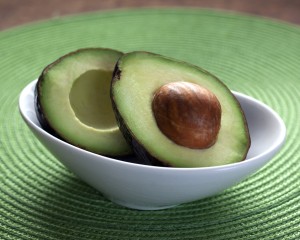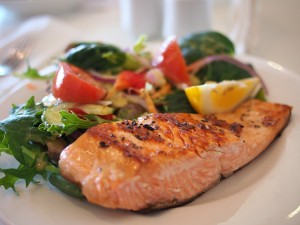There has been plenty of buzz in recent nutrition news about fats. From adding olive oil to your salad, coconut oil to your coffee and spreading nut butter on your whole grain bread — can this actually all be healthy for you? There is no simple answer to this, but we have worked on breaking down some of the misconceptions and truths about fats for you to gain a better understanding.
According to the 2010 Dietary Guidelines for Americans, adults should keep total dietary fat intake to 20-30 percent of daily intake. However, the type of fat consumed is the most important factor in this equation. Unsaturated fatty acids are considered essential to a healthy diet. Ultimately, fat does have more calories per gram than carbohydrates and protein, so minimizing proportions is important for preventing weight gain. However, some consumption is necessary. Below, we explain the difference between some of these fats and hopefully clear some of this confusion.
Saturated Fats
 This fatty acid chain is considered saturated as all the carbons on the chain are “saturated,” or filled by hydrogen. It is considered a “bad fat” because it is known to incerease LDL (bad cholesterol) and total cholesterol. Its properties consist of being solid at room temperature, having a high melting point and being most likely to become rancid. Some example food sources include butter, cheeses, fattier cuts of animal meats, ice cream and margarine. These are
This fatty acid chain is considered saturated as all the carbons on the chain are “saturated,” or filled by hydrogen. It is considered a “bad fat” because it is known to incerease LDL (bad cholesterol) and total cholesterol. Its properties consist of being solid at room temperature, having a high melting point and being most likely to become rancid. Some example food sources include butter, cheeses, fattier cuts of animal meats, ice cream and margarine. These are
considered non-essential fats.
 Monounsaturated Fats
Monounsaturated Fats
Monounsaturated fatty acids are known to reduce the risk of heart disease by lowering LDL (bad cholesterol) and raising HDL (good cholesterol). These fatty acids are liquid at room temperature, have lower melting points than saturated fats, but may become rancid when exposed to light and oxygen for extended periods of time. Some example food sources of monounsaturated fats are avocados, nuts, olives and peanut butter.
 Polyunsaturated Fats
Polyunsaturated Fats
Polyunsaturated fats are beneficial as they decrease harmful LDL cholesterol. However, they may also decrease HDL cholesterol. This fatty acid will decrease total cholesterol when used in place of saturated fats. Some sources of polyunsaturated fats are fish such as salmon, herring and mackerel as well as walnuts and soybean oil.
Omega-3 and Omega-6 Polyunsaturated Fats
 Both omega-3 and omega-6 fatty acids are considered essential. Eicosapentaenoic acid (EPA) and docosahexaenoic acid (DHA), found in omega-3s, are related to the prevention and treatment of heart disease, high blood pressure, arthritis and cancer. Omega-3s must be eaten from outside sources; therefore, it is important to consume foods such as flax seed, nuts and salmon that contain this fatty acid. Omega-6 fatty acids are more readily available in our Western diets. They are found in most foods such as vegetable oils, poultry and other meats.
Both omega-3 and omega-6 fatty acids are considered essential. Eicosapentaenoic acid (EPA) and docosahexaenoic acid (DHA), found in omega-3s, are related to the prevention and treatment of heart disease, high blood pressure, arthritis and cancer. Omega-3s must be eaten from outside sources; therefore, it is important to consume foods such as flax seed, nuts and salmon that contain this fatty acid. Omega-6 fatty acids are more readily available in our Western diets. They are found in most foods such as vegetable oils, poultry and other meats.
It is important to consume a healthy diet where 20-30 percent of your calories come from these unsaturated fatty acids. Aim for about two portions per week of fish such as salmon, and include nuts, avocados and olive oil to your daily intake. Remember that portion control is important with these calorie-dense foods. However, having a variety of them as part of your daily intake is key to a heart-healthy diet.
 About the Author:
About the Author:
Leah Kaufman is a Registered Dietitian at the NYU Langone Weight Management Program. She is a graduate of Columbia University with a Masters of Science in Nutrition Education. Leah works primarily with the bariatric and nonsurgical weight management program to help patients meet their nutrition related and weight-loss goals through nutrition counseling.





